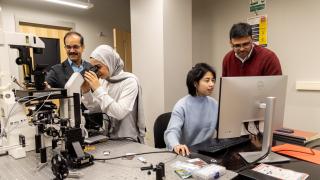
External Awards Received
The Office of Research is pleased to announce and would like to congratulate our Dearborn faculty members on receipt of the following external funding:
U-M Principal Investigator: Xuan Zhou
Project Title: ERI: In-Situ Observing the Formation of Lithium-Ion Batteries via Optical Sensors
Direct Sponsor: National Science Foundation
Award Amount: $200,000
This project aims to improve the manufacturing of lithium-ion batteries by using special optical sensors to monitor their internal processes in real-time. By embedding these sensors inside the batteries, we can observe how key components form and change, helping us make the batteries safer, more efficient, and longer-lasting. Ultimately, this could lead to faster and more cost-effective battery production, benefiting everything from electric cars to portable electronics.
U-M Principal Investigator: Shan Bao
Project Title: Data-Driven Approach for Enhancing Electric Vehicle Charging Infrastructure through Driver-to-Driver Communication
Direct Sponsor: Ford Motor Company
Total Sponsor Authorized Amount: $199,999
Dr. Bao aims to revolutionize the charging user interface for electric vehicles (EVs) through a user-centered design approach, introducing driver-to-driver communication functionalities to overcome the limitations of existing interfaces lacking social interaction and real-time support. This will be done by harnessing the transformative potential of driver-to-driver communication, optimizing EV charging station utilization and reducing wait times, particularly during peak hours. The results of this project will provide invaluable insights and data-driven recommendations to elevate both the user experience and the future of electrifying transportation through seamless communication and synchronized coordination at charging stations.
U-M Principal Investigator: Samir Rawashdeh
Project Title: Robotic wireless signal strength mapping of industrial facilities
Direct Sponsor: MxD
Total Sponsor Authorized Amount: $899,602
In this project, Dr. Rawashdeh and his team will develop an autonomous mobile robot that is equipped to survey wireless signal strengths and map them to a custom, two-dimensional floor layout. The robot will use a scanning Lidar and sensor suite to map and maneuver in complex and diverse environments, including those with tight spaces, while avoiding people and objects.
Announcements
REMINDER: New NSF Requirements for Biosketch, Current & Pending Forms
The newest NSF PAPPG is in effect for all proposals submitted effective May 20 includes a requirement to use an updated version of both the Current & Pending Support form as well as the Biosketch form from the SciENcv tool. In addition, significant changes have been made to the biographical sketch required for all senior personnel. The biosketch will no longer include the section for “synergistic activities” and instead this will become a separate required document.
SciENcv offers researchers the option to create a new Current & Pending form or Biosketch for proposals after May 17, 2024. It will also allow you to migrate your data from the old form to the new form. In addition, the three-page limitation of the biographical sketch has been removed–there is no longer any page limitation for this section of the proposal.
Instructions for the new Synergistic Activities document are available in our shared folder of Standard NSF Proposal guides & templates resource for faculty.
The Electric Power Research Institute (EPRI) Opens Request for Proposals
The Electric Power Research Institute (EPRI) is soliciting proposals from graduate and undergraduate university research institutions for the 2024 EPRI University Global Research Award. Funding will be awarded to pursue energy-focused research that aims to explore and accelerate economy-wide decarbonization (inclusive of challenges and opportunities across the energy industry) and explore emerging (clean) energy solutions. Topic areas include:
- Clean Energy Technologies
- Electric System and Customer Reliability and Resilience
- Electric System Flexibility
- End-use and Economy-wide Carbon Reduction
- Market Transformation
- Open Category: Innovation
Proposals are accepted on a rolling basis until Oct. 1, 2024. Learn more and how to apply via the Innovation Partnerships’ ERPI flier.
Student Research Recruitment and Training
The Office of Research partners with Experience Plus to promote and support student research engagement on our campus. The Student Research Opportunities Board (SROB) is a centralized platform designed to connect students to the diverse array research opportunities available at UM-Dearborn. If your research project would benefit from an undergraduate or graduate student, we strongly encourage you to post it on the SROB. These opportunities can include your campus or external grant and cover:
- Paid research experiences
- For credit independent study projects
- Volunteer research positions at UM-Dearborn
- Externally funded research positions
Experience Plus also manages independent research and conference travel grants for both graduate and undergraduate students if you want to incorporate an independent study or conference travel for your student researcher. These grants are available on a first-come, first-served basis. Visit the Experience Plus website to learn more about these student research grants!
If you have any questions, please reach out to Experience Plus at [email protected].
Reminder: Resources for Using SciENcv
Effective Oct. 23, 2023 NSF requires all biosketch and current & pending support documents for senior personnel to be prepared using SciENcv. The fillable pdf forms are no longer accepted. We recommend that you take the time to register with ScieENcv and begin to create your documents in that system if you expect to be involved in a proposal to NSF in the near future.
U-M Library Services has put together this guidance page to help you get started. You can also request a one-on-one Zoom session with Dearborn Office of Research staff to walk you through this process. Science Experts Network Curriculum Vitae (SciENcv) is a researcher profile system for all individuals who apply for, receive or are associated with research investments from federal agencies. SciENcv allows researchers to document their education, employment, research activities, publications, honors, research grants, & other professional contributions to create multiple SciENcv profiles in official biographical sketch formats funding agencies such as the National Institutes of Health (NIH), the National Science Foundation (NSF), and the Institute of Education Sciences (IES). In addition, the SciENcv application can be used to create the official NSF Current and Pending Support document.
Any researcher can register for SciENcv and create multiple biosketches, for different research projects or different funding agencies. You can find much more information about how to use SciENcv on their FAQs page. The central Office of Research and Sponsored Programs and U-M Library have resources and previous workshops available on how to create a biosketch in SciENcv specifically focused on NSF and NIH. These resources are available linked below:
- U-M Library SciENcv Guide (including step-by-steps for creating NSF and NIH biosketches)
- NSF Biosketch and SciENcv Webinar (July 2020)
- Slide Deck (MLibrary Presentation)
- NSF Biosketch Webinar Transcript
- How to Create Your NSF Biosketch in SciENcv Step-by-step (MLibrary Handout)
- NIH Biosketch and SciENcv Webinar (May 2020)
- Slide Deck (MLibrary Presentation)
- NIH Biosketch Webinar Transcript
- Biosketch and SciENcv Step-by-Step (MLibrary Handout)
If you have questions about SciENcv, need additional support, or would like to schedule one-on-one assistance with setting up your SciENcv profile and documents, please email our office at [email protected].
Research Events in June
- Research Data Stewardship Initiative, “Getting your Data ‘Ducks; in a Row: New Data Management Resources from RDSI” - Thursday, June 27, 11 a.m.-12 p.m., virtual
The Office of Research website is also updated regularly with research-related events and announcements, so we would encourage you to bookmark our landing page and subscribe to our Research News email list.
Research Resource Highlight:
MIDAS User Guide for Using Generative AI for Scientific Research
Every month, the Office of Research features a resource and/or tool that is available for researchers. This month we are featuring the Generative AI for Scientific Research User Guide, developed by the Michigan Institute for Data Science (MIDAS).
The Generative AI for Scientific Research User Guide includes frequently asked questions and shows how GenAI can be used throughout the entire research process, based on published guidelines from journals, funding agencies, professional societies, and MIDAS’ assessment of GenAI’s benefits and risks. The guide covers topics such as:
- Technical Guides for Using Generative AI
- Using Generative AI for Writing
- Using Generative AI to Improve Productivity
- Using Generative AI for Data Generation and Analysis
- Reporting the Use of Generative AI
- Considerations for Choosing Generative AI Models
For suggestions for improvements or additions, please email [email protected].
Upcoming Funding Opportunities
The Office of Research publishes a list of selected funding opportunities, organized by college, every month on our website under Announcements. In addition, yearly grant calendars organized by subject area provided by Hanover Research are available there as well.
Use the updated U-M Research Commons to look up internal (to U-M) funding opportunities and Limited Submission opportunities open to Dearborn researchers.
Contact the UM-Dearborn Office of Research if you would like more information about submitting a proposal to any of the programs.



